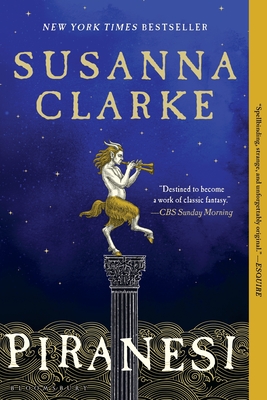SNQ: Susanna Clarke’s “Piranesi”
by Miles Raymer

Summary:
Susanna Clarke’s Piranesi is a fantasy book in which the titular character attempts to understand the fundamental nature of the “House” he inhabits. The House is a seemingly-endless chain of statue-filled Halls rising out of an ocean. As Piranesi learns more about the House and encounters other characters within its labyrinthine structure, he becomes increasingly skeptical of the theoretical assumptions that undergird his simple life of survival and exploration.
Key Concepts and Notes:
- The book’s central conceit is something called the “Theory of Other Worlds,” which is a clever but unscientific spin on the ultra-trendy multiverse hypothesis. This includes some interesting descriptions of hallucinations and depictions of what it’s like to question one’s own sanity.
- Clarke provides intriguing commentary about the value of science, specifically the ethical question of whether the the scientific enterprise should be focused on helping humanity to discover and utilize god-like powers. But I felt like she dabbled in some false dichotomies that weakened this aspect of the novel––primarily her arbitrary and ineffective attempt to distinguish the concept of “science-as-progress/power” from the concept of “science-as-observation/appreciation of nature.”
- The book is generously short, but even so I found it dull to read. The opening and final acts both bored me, with things getting good for a while in the middle. There were a handful of moments that were genuinely sinister and engrossing, but they were few and far between.
- I didn’t connect emotionally with any of Clarke’s characters and didn’t care what happened to them. Piranesi felt wooden and distant as a narrator, despite being a generally likable fellow.
- Overall, I see Piranesi as one of those “good idea, lousy execution” novels. In the context of my lukewarm reaction to one of Clarke’s previous books, I’m starting to think that I just don’t connect with her work the way that lots of other readers seem to.
Favorite Quotes:
Writing inculcates habits of precision and carefulness. (12)
Perhaps the wisdom of birds resides, not in the individual, but in the flock, the congregation. (41)
I realised that the Search for the Knowledge has encouraged us to think of the House as if it were a sort of riddle to be unravelled, a text to be interpreted, and that if ever we discover the Knowledge, then it will be as if the Value has been wrested from the House and all that remains will be mere scenery. (60)
Perhaps even people you like and admire immensely can make you see the World in ways you would rather not. (228)
This is not on my reading list, so nothing spoiled. 🙂 You are right, some readers and writers just don’t connect. Also, if you don’t care about the characters – there is nothing about their story that you will care about.